Our First Meeting on October 6th
We started off by defining some of the key terms relating to our project. When we hear the project name Eco Entrepreneurship, we all have some immediate associations, what it might be about. But instead of just settling with a hunch it is important that we all know, what we are referring to.
The terms that we discussed were Ecological, Circular vs. Finite Economy, Eco-entreprise, Innovation, Eco-innovation and Eco-social-innovation.
Here are some topics, which we took up in connection with the discussion of these terms:
Ecological
Plastic or Paper bag - which will you choose at the counter? The paper bag is brown, so it has to be more ecological - or is it? Although we all know, which criteria an ecological product should fulfill, it is not always easy to recognize the option with the smallest ecological footprint. In relation to this question, we watched the first 3,5 minutes of Leyla Acaroglu's inspiring Ted Talk:
Circular economy
Circular economy aims to keep products, components and materials and the value bound to them in circulation for as long as possible. The production and consumption create as little waste and loss as possible. The circular economy is referred to as a closed system, where the resources are returned into productive use again and again. Meanwhile, the amount of waste is also reduced. The products are designed and the materials chosen considering the durability and recyclability of the product.
The textile manufactorer Finlayson is offering to buy used linen in order to produce carpets. Nanso makes jewelry out of used stockings. Voglia and Marimekko produce bags and pouches from waste material. Joutsen offers a repair service for their down products and Arela care for their cashmir products.
Eco Entrepreneurship
We need to distinguish between the environmental strategies of big companies and Eco-entreprises.
An Eco-entreprise is a company, which has turned an environmental challenge or problem into a profitable business idea. In the USA eg. there is a family business, who collects biowaste from the neighbourhood, turns it into compost and sells it to its customers.
Some of the business ideas might be nothing new - but temporarily forgotten in our throwaway society: A repair shop for bikes or electric devices or a service shop who clean airconditioners, which in turn leads to energy savings for the customers.We all know you can rent a party dress - but why not expand this to childrens' or winter clothes.
A very inspiring example is the Piggybaggy-application of the company Coreorient:
Entrepreneurship
In Finnish, entrepreneurship can also be translated into yritteliäisyys, ie. trying hard, relentlessly.
Being an entrepreneur is a way of thinking, a way of life. We usually only see the big success stories like Supercell - but not the 1000 failed attempts that went before.
There was a documentary on Finnish television about a Finnish team, who developed the Swing Game. Although it provokes quite different associations for the English reader, the game turned out to be a simple copy of Angry Birds, basically. The viewer soon understood, that this bird would not fly very high. What is relevant for entrepreneurship is - however - that you could throw up any idea in the team. No one would laugh at the others' suggestion but evolve on it. The team worked relentlessly and came up with many innovative ways to promote the game:
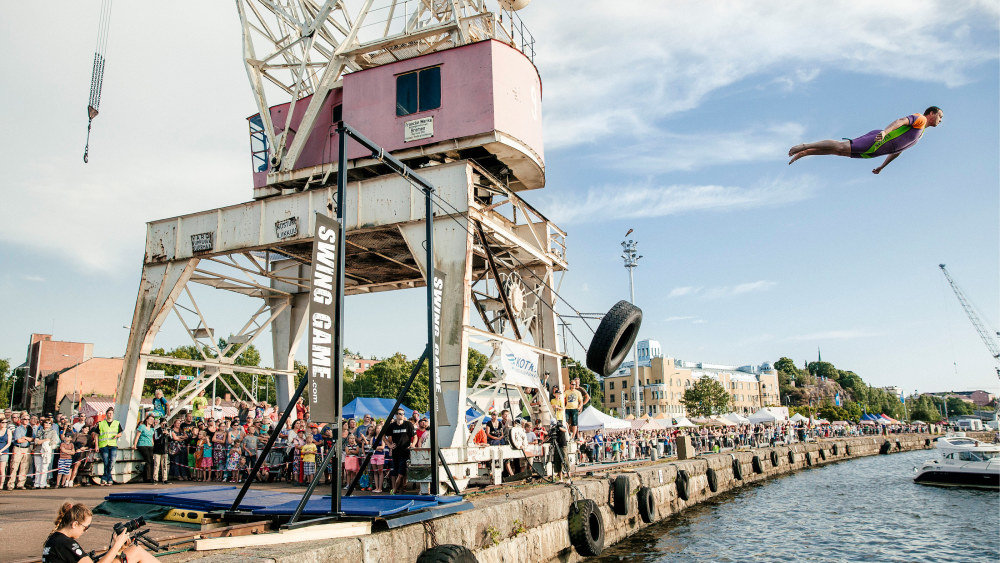
This foto is by yle. Read the related article about the Swing Game -project.
Another example is the Finnish company Gugguu, who produce childrens' clothing. Two sisters were tired with baby clothes that were too wide and short at the same time. They could no longer bear with the same-old retro-patterns. When they started their own company, they heard comments like: "Girls, girls, these boots are too big for you". In 2015 their annual turn-over was 1 685 000 Euros. To the article.

Gugguu´s products sell like hot cakes. (Foto: Helsingin Sanomat)
We are not about to found a company, but our aim is to come up with small innovations, which will offer a solution for an ecological challenge or problem and inspire and motivate people to follow our example. In the process, we will face similar challenges and hurdles like the creators of the Swing Game and Gugguu.
Innovation
An innovation is not only a new product, but it can also be a new way to act or use alredy existing resources.
All innovations start with the observation, that there is a problem that needs to be solved. This is how man invented the ax, wheel and plough. There is the realisation, that something can be achieved more easily or efficiently in matter of time and/ or resources. The German inventor of robots famously stated, that he was just too lazy to calculate.
Often, the knowledge is already there as tacit knowledge. For example in Lempäälä, a neighbouring municipality of Tampere, the employees of the city were asked, how things could be improved and be done more smartly at their working places. In the end they received more than 600 ideans and initiatives. One observation was, that an enormous amount of cleaning products was going to waste because of short expiring periods. Replacing these products and making other changes led to savings up to 2 Million Euros. To the article.
Eco-Social-Innovation
We were very happy to receive our first guest, Sanna Nevala, who worked as a volunteer in Iringa/ Tansania for 2 years. She coordinated a workshop for locals called RLabs, where also a Eco-Social-innovation was born.
In the workshop, which Sanna presents in the picture below, the participants were sent out to the town to collect waste, which they used to build the Iringa of their dreams with all the functions they thought that were needed:
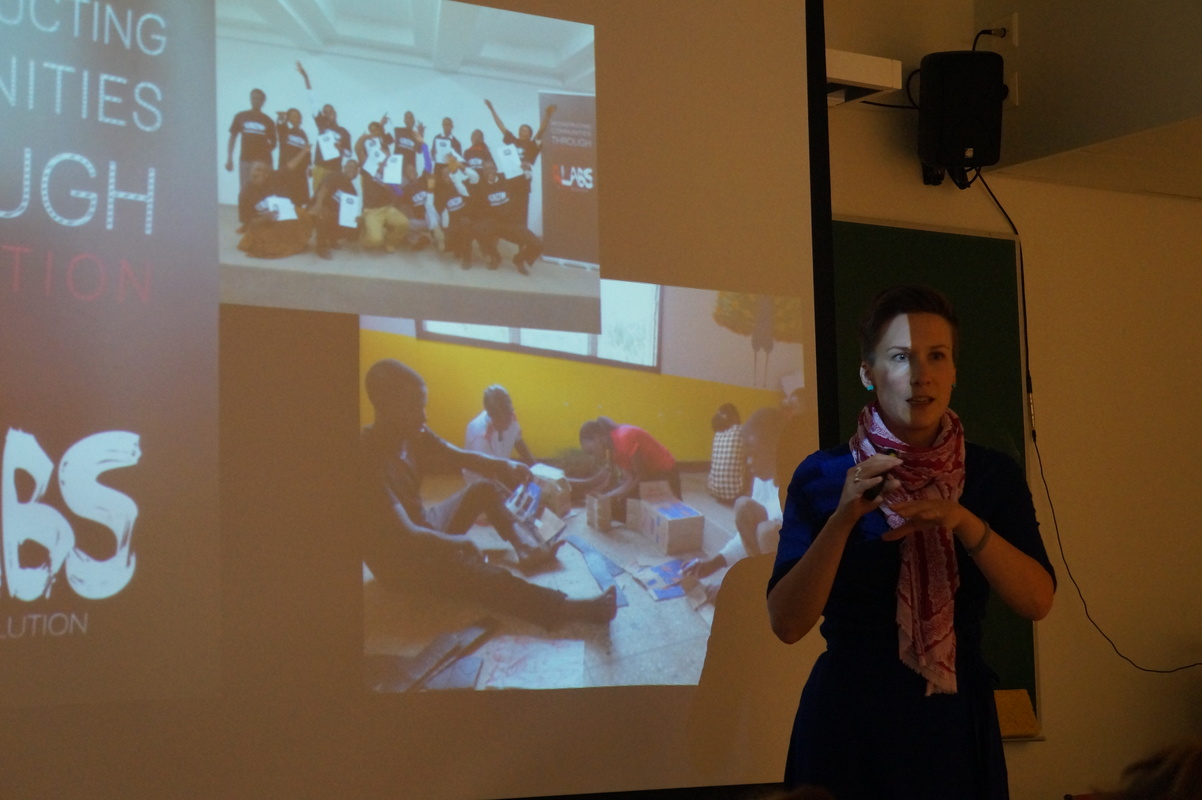
A Social innovation benefits the community. According to Sanna, RLabs is thus a social innovation in itself. She pointed out, that you don't learn innovating at Tansanian schools. There, the teacher is seen as an authority. It might not be evident to us, but we are encouraged to independant thinking from early on. RLabs taught the local participants a new way of thinking, in which they can take matters in their own hands and turn a problem into a way of income. Former participants now continue the project and share their aquired knowledge with others.
Go to the pages of RLabs.
an Eco-innovation solves an ecological problem, and Eco-Social-innovation also benefits the community at the same time.
In Iringa, there is a big problem with waste management. Consequently people dispose of their garbage by burning it in their yards. Two men turned this problem into a business idea. One of them owned a tuk-tuk, which they now used to collect garbage from middle-income neighborhoods for a fee:
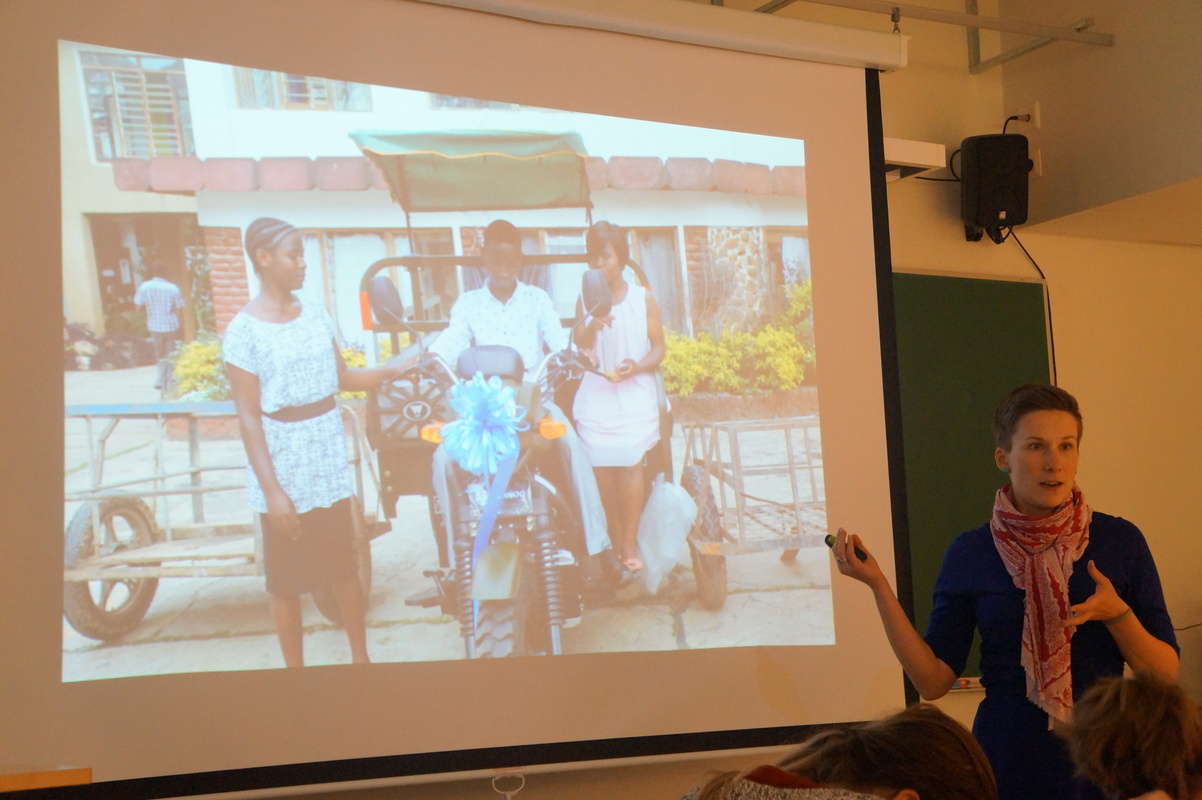
The principle of RLabs is that you do not need any foundation, but you ask yourself, what you can do with the resources you already have. Another good example was a group of people, who made lean chairs and garden decorations out of old car tires:
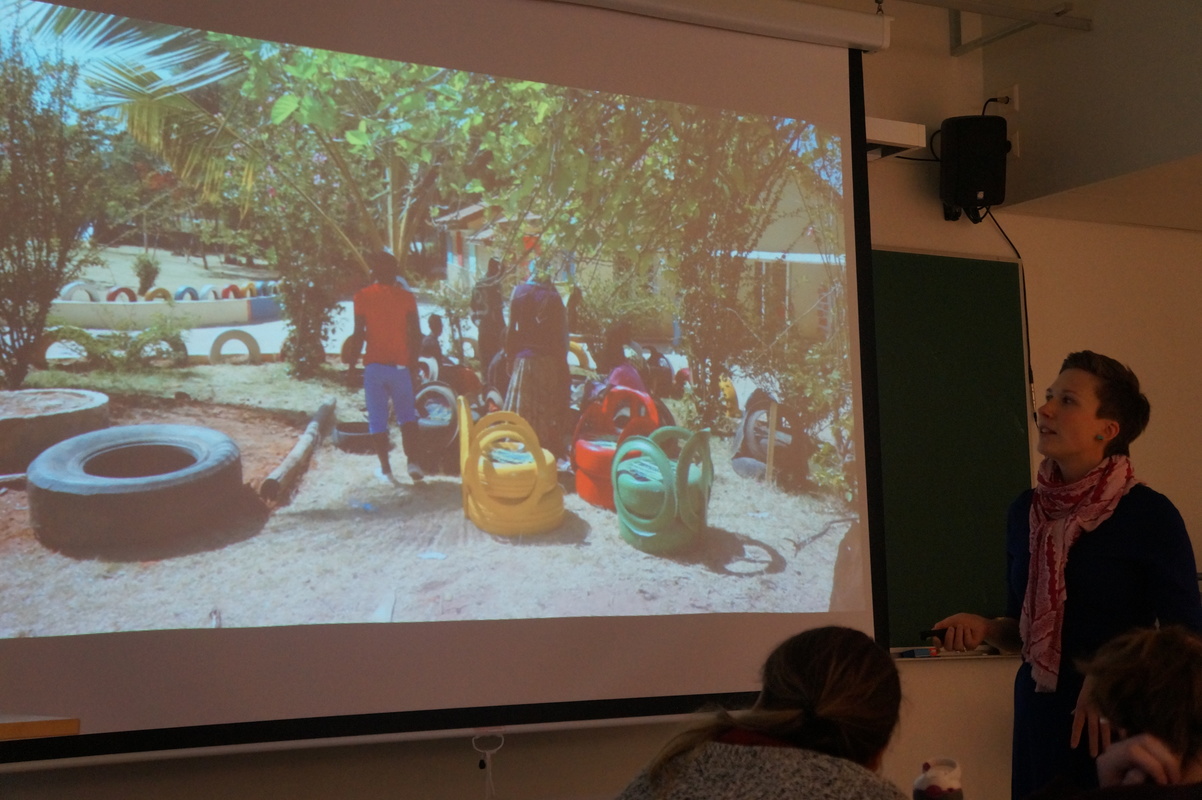
A young man started producing bags from recycled package materials:
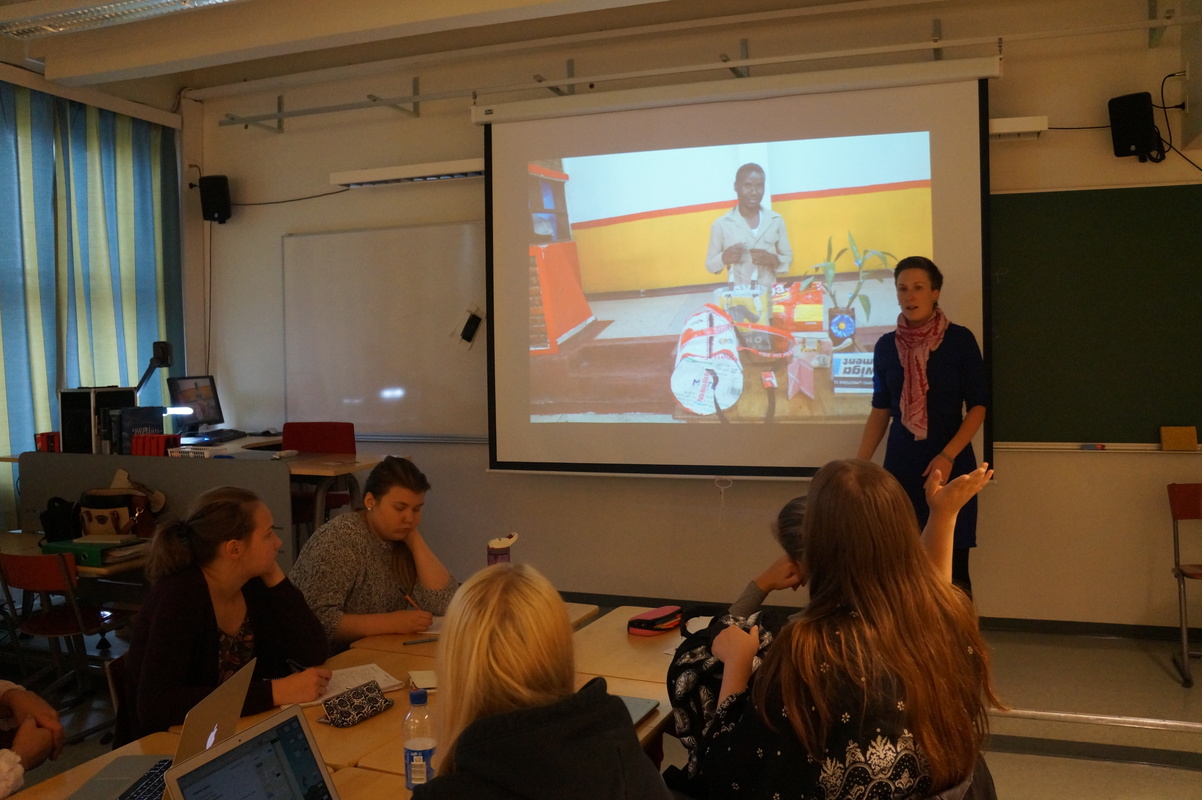
Sanna held a workshop for us, which they also did with RLabs. The participants received a coat hanger, an empty bottle and a pair of scissors with the task to find completely new usages for them. This task is according to the notion of ecological innovation: We use existing resources for new purposes.

You can melt the metal of this item and produce jewelry. If you take it apart, you end up with two knives.

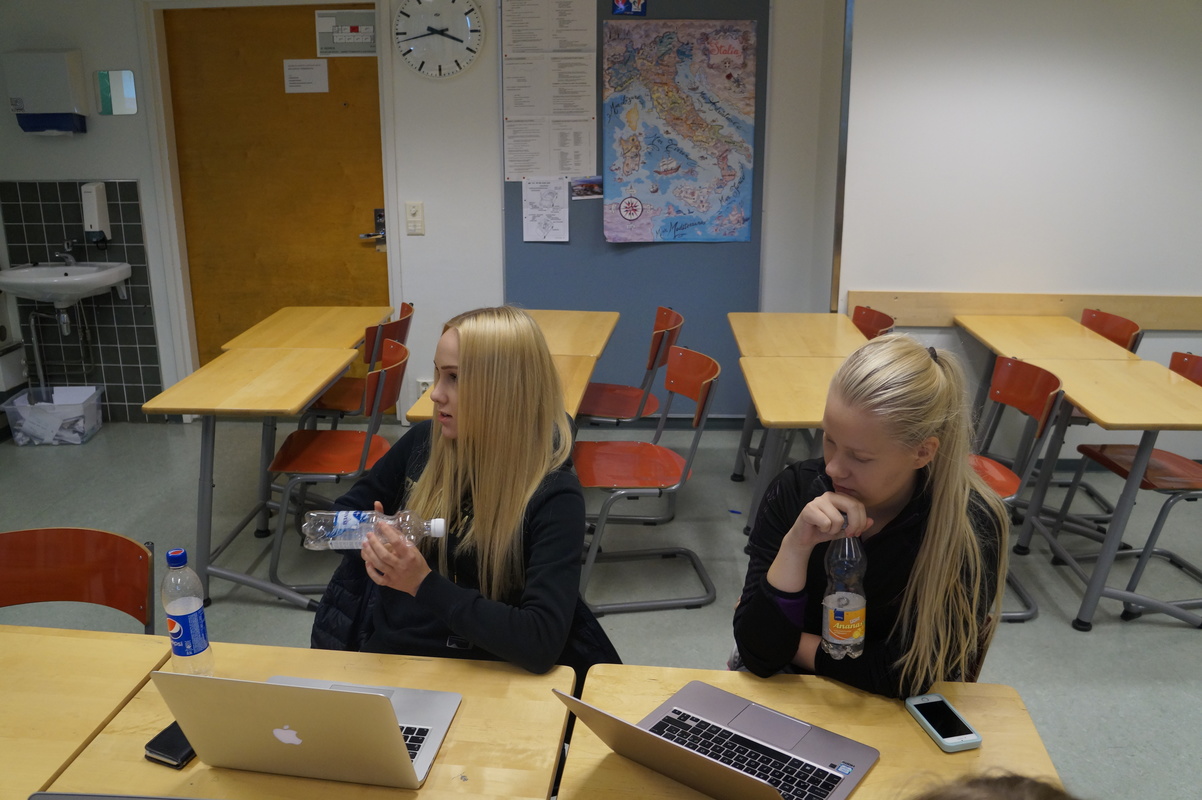
Homework:
1. Observe your living environment. What works in an ecological sense and what does not?
2. Which Eco-Entreprises can you detect? Keep your eyes open when walking in the city and also ask your family and friends.
The terms that we discussed were Ecological, Circular vs. Finite Economy, Eco-entreprise, Innovation, Eco-innovation and Eco-social-innovation.
Here are some topics, which we took up in connection with the discussion of these terms:
Ecological
Plastic or Paper bag - which will you choose at the counter? The paper bag is brown, so it has to be more ecological - or is it? Although we all know, which criteria an ecological product should fulfill, it is not always easy to recognize the option with the smallest ecological footprint. In relation to this question, we watched the first 3,5 minutes of Leyla Acaroglu's inspiring Ted Talk:
Circular economy
Circular economy aims to keep products, components and materials and the value bound to them in circulation for as long as possible. The production and consumption create as little waste and loss as possible. The circular economy is referred to as a closed system, where the resources are returned into productive use again and again. Meanwhile, the amount of waste is also reduced. The products are designed and the materials chosen considering the durability and recyclability of the product.
The textile manufactorer Finlayson is offering to buy used linen in order to produce carpets. Nanso makes jewelry out of used stockings. Voglia and Marimekko produce bags and pouches from waste material. Joutsen offers a repair service for their down products and Arela care for their cashmir products.
Eco Entrepreneurship
We need to distinguish between the environmental strategies of big companies and Eco-entreprises.
An Eco-entreprise is a company, which has turned an environmental challenge or problem into a profitable business idea. In the USA eg. there is a family business, who collects biowaste from the neighbourhood, turns it into compost and sells it to its customers.
Some of the business ideas might be nothing new - but temporarily forgotten in our throwaway society: A repair shop for bikes or electric devices or a service shop who clean airconditioners, which in turn leads to energy savings for the customers.We all know you can rent a party dress - but why not expand this to childrens' or winter clothes.
A very inspiring example is the Piggybaggy-application of the company Coreorient:
Entrepreneurship
In Finnish, entrepreneurship can also be translated into yritteliäisyys, ie. trying hard, relentlessly.
Being an entrepreneur is a way of thinking, a way of life. We usually only see the big success stories like Supercell - but not the 1000 failed attempts that went before.
There was a documentary on Finnish television about a Finnish team, who developed the Swing Game. Although it provokes quite different associations for the English reader, the game turned out to be a simple copy of Angry Birds, basically. The viewer soon understood, that this bird would not fly very high. What is relevant for entrepreneurship is - however - that you could throw up any idea in the team. No one would laugh at the others' suggestion but evolve on it. The team worked relentlessly and came up with many innovative ways to promote the game:

This foto is by yle. Read the related article about the Swing Game -project.
Another example is the Finnish company Gugguu, who produce childrens' clothing. Two sisters were tired with baby clothes that were too wide and short at the same time. They could no longer bear with the same-old retro-patterns. When they started their own company, they heard comments like: "Girls, girls, these boots are too big for you". In 2015 their annual turn-over was 1 685 000 Euros. To the article.
Gugguu´s products sell like hot cakes. (Foto: Helsingin Sanomat)
We are not about to found a company, but our aim is to come up with small innovations, which will offer a solution for an ecological challenge or problem and inspire and motivate people to follow our example. In the process, we will face similar challenges and hurdles like the creators of the Swing Game and Gugguu.
Innovation
An innovation is not only a new product, but it can also be a new way to act or use alredy existing resources.
All innovations start with the observation, that there is a problem that needs to be solved. This is how man invented the ax, wheel and plough. There is the realisation, that something can be achieved more easily or efficiently in matter of time and/ or resources. The German inventor of robots famously stated, that he was just too lazy to calculate.
Often, the knowledge is already there as tacit knowledge. For example in Lempäälä, a neighbouring municipality of Tampere, the employees of the city were asked, how things could be improved and be done more smartly at their working places. In the end they received more than 600 ideans and initiatives. One observation was, that an enormous amount of cleaning products was going to waste because of short expiring periods. Replacing these products and making other changes led to savings up to 2 Million Euros. To the article.
Eco-Social-Innovation
We were very happy to receive our first guest, Sanna Nevala, who worked as a volunteer in Iringa/ Tansania for 2 years. She coordinated a workshop for locals called RLabs, where also a Eco-Social-innovation was born.
In the workshop, which Sanna presents in the picture below, the participants were sent out to the town to collect waste, which they used to build the Iringa of their dreams with all the functions they thought that were needed:

A Social innovation benefits the community. According to Sanna, RLabs is thus a social innovation in itself. She pointed out, that you don't learn innovating at Tansanian schools. There, the teacher is seen as an authority. It might not be evident to us, but we are encouraged to independant thinking from early on. RLabs taught the local participants a new way of thinking, in which they can take matters in their own hands and turn a problem into a way of income. Former participants now continue the project and share their aquired knowledge with others.
Go to the pages of RLabs.
an Eco-innovation solves an ecological problem, and Eco-Social-innovation also benefits the community at the same time.
In Iringa, there is a big problem with waste management. Consequently people dispose of their garbage by burning it in their yards. Two men turned this problem into a business idea. One of them owned a tuk-tuk, which they now used to collect garbage from middle-income neighborhoods for a fee:

The principle of RLabs is that you do not need any foundation, but you ask yourself, what you can do with the resources you already have. Another good example was a group of people, who made lean chairs and garden decorations out of old car tires:

A young man started producing bags from recycled package materials:

Sanna held a workshop for us, which they also did with RLabs. The participants received a coat hanger, an empty bottle and a pair of scissors with the task to find completely new usages for them. This task is according to the notion of ecological innovation: We use existing resources for new purposes.

You can melt the metal of this item and produce jewelry. If you take it apart, you end up with two knives.

- If you are cooking two dishes at the same time, you can use this device to stir both without washing it in between using both ends.
- You can use this to slide down a rope
- You can use it as a ruler
- You can hang something on the hook

- You can refill this item.
- If you cut this item in two you can use this item as a pencil holder or a cookie cutter form
- You can use it as a foam roller
- You can use it for storage
- You can create furniture for Barbie-dolls
- You can use it to scratch or massage your back
- You can use the lable for jewelry or little pouches
- You can melt it and make decorative items with it
Homework:
1. Observe your living environment. What works in an ecological sense and what does not?
2. Which Eco-Entreprises can you detect? Keep your eyes open when walking in the city and also ask your family and friends.
Kommentit
Kirjaudu sisään lisätäksesi tähän kommentin